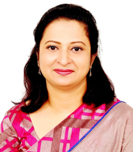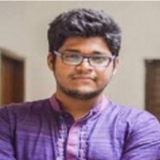Special Session
Title: Robotics for Challenging Environment
Organizers: Dr. Lafifa Jamal, Mohammad Shidujaman, Sujan Sarker
Objectives and Motivation: click here

Dr. Lafifa Jamal
Professor
Department of Robotics and Mechatronics Engineering
University of Dhaka, Bangladesh
Dr. Lafifa Jamal is currently working as the Professor of the Department of Robotics and Mechatronics Engineering, University of Dhaka. She is the former Chairperson of the same department. Previously, she was the faculty member of the Department of Computer Science and Engineering, University of Dhaka. She was awarded Doctor of Philosophy in Computer Science and Engineering specializing in Reversible Logic Synthesis. At present, she is the President of Bangladesh Women in Technology (BWIT), Treasurer of Bangladesh Computer Society (BCS) and Vice President of Bangladesh Open Source Network (BdOSN). Dr. Jamal is a Senior Member of IEEE. She is a member of the Central Committee of International Robot Olympiad. Currently, she is the Membership Development Coordinator of IEEE Robotics and Automation Society (RAS) Bangladesh Chapter, Advisor of IEEE RAS University of Dhaka Student Branch Chapter and Moderator of Dhaka University Science Society. Formerly, she was the Advisor of IEEE University of Dhaka Women in Engineering Student Branch Affinity Group. She has been elected to the Senate of Dhaka University and has also been an elected member of the Dhaka University Teachers’ Association (DUTA) several times. Actively involved with research, Dr. Jamal has around fifty research publications in reputed international journals and conferences. One of her papers got the best paper award in an international conference. She attended various seminars, conferences and workshops internationally. She delivered invited talk in South Korea, USA, China and other countries. She was the Technical Program Committee Chair of 2nd International Conference on Innovation in Engineering and Technology (ICIET 2019), Regional Program Chair of The 6th International Conference on Robotics, Informatics, and Intelligence control Technology (RIIT 2018, Thailand); General Co-Chair of 1st International Conference on Innovation in Engineering and Technology (ICIET 2018); General Chair of 3rd Student Conference on Science and Engineering (SCSE 2017) and actively involved organizing different International Conferences. Under her dynamic leadership Bangladesh got the very first Gold Medal in International Robot Olympiad 2018 which was held in Manila, Philippines. She was the convenor of the National Girls Programming Contest 2015 which played a significant role to raise the awareness of computer programming in female students of Bangladesh.

Mohammad Shidujaman
Dept. of Information Art and Design, Academy of Arts and Design
Tsinghua University
Beijing, China
Mohammad Shidujaman is currently a Ph.D. candidate with the Department of Information Art and Design, Academy of Arts and Design, Tsinghua University, Beijing, China. His research interests include human-robot interaction, autonomous systems, artificial intelligence, new interaction paradigm etc. His PhD research focuses on the emotion-based interaction design to implement into the social robots to bring out the artistic relation during human-robot communication. He is the recipient of the fully-funded Chinese Government Scholarship (CGS) and the State Key Laboratory of Tribology foreign doctoral/Post-doc research fellowship by Tsinghua University. He is the winner of the summer school speech competition organized by the University of Michigan- Shanghai Jiao Tong University Joint Institute (UM-SJTU JI) in Shanghai, China; 1st team project winner of the course competition titled “Facebook Innovation and Entrepreneurship: Insights from Silicon Valley” organized by the Facebook Inc., Tsinghua University School of Economics and Management (THU SEM) and Tsinghua X-Lab in Beijing, China; 1st Prize award winner in the graduate consortium of IEEE ICIEV (International Conference on Informatics, Electronics and Vision) in Kitakyushu, Japan. Before joining Tsinghua University, he has earned his M.Sc. degree and awarded Best Student (Fei Yuan Jiang) from the Department of Electrical Engineering, National Taipei University, New Taipei City, Taiwan in 2015 and received his B.Sc. degree from the Department of Electrical and Electronic Engineering, American International University- Bangladesh in 2012. He was invited as a visiting fellow at the Department of Electronic Engineering, Shibaura Institute of Technology, Tokyo, Japan during this Ph.D. study. He is currently serving as the Technical Committee Member on Cognitive Robotics in IEEE Robotics and Automation Society (IEEE RAS). He is also actively serving robotics and AI related journals and international conferences as Editorial Board member, Organizing Committee member, workshop organizer and reviewer.

Sujan Sarker
Lecturer,
Department of Robotics and Mechatronics Engineering,
University of Dhaka, Bangladesh
Sujan Sarker is currently working as a lecturer in the Department of Robotics and Mechatronics Engineering, University of Dhaka, Bangladesh. Before that he worked as an assistant professor in the Department of Computer Science and Engineering, Ahsanullah University of Science and Technology. He received the B.S. and M.S. degrees from the Department of Computer Science and Engineering, University of Dhaka, Dhaka, Bangladesh, in 2013 and 2017, respectively. He is the recipient of ICT fellowship by the Ministry of Information and Communication Technology (MOICT), Government of the People's Republic of Bangladesh for his MS work. His research interests include sensor networks, participatory sensing, mobile crowdsourcing, human robot interaction, IOT and swarm robotics. He published several journal and conference papers including IEEE Internet of Things (IOT) journal. He also worked as a reviewer of several journals and conferences. He is a member of Green Networking Research Group of the University of Dhaka, IEEE, IEEE Computer Society and IEEE Robotics and Automation Society.
Objectives and Motivation
Robotics and automation have already improved various aspects of our life. It has made our life much easier by assisting in our day to day life activities. But there is one particular area where the application of robotics and automation can make a huge impact. That area is robotics for challenging environment. Challenging environments are those environments where it's either tough or risky for a human to operate efficiently. For example, humans find it difficult to work underwater, underground or outer space because of various factors like lack of sufficient oxygen, extreme temperature, and pressure. However, as a robot doesn't face these types of problems, these tasks are better delegated to robots. Design of robot for medical purposes, for example, surgical robots or robots which can take decision regarding diagnoses, also fall into this category. Another common example of such robot is search and rescue robot or a drone.
Robot designed for this type of tasks should have situation awareness, complex and sophisticated intelligent system, and higher level of autonomy so that it can perceive the environment well, take intelligent decision based on the perceived information and act autonomously. Delegating these tasks to robots will make the total process easy, efficient and less expensive.
List of Topics
- Rescue planning
- Underwater robotics
- Underground robotics
- Robot for outer space
- Medical robots
- Mobile robot for security purpose
- Image processing for environment understanding
- Physical and social interaction among robots and humans
- Robot inspector for low-level radioactive waste
- Application and challenges for robotics for challenging environment
- Social robot
- Human robot interaction
- Human robot trust
- Human centered design
ICIPRoB2020 Call for Special Session Proposals
Instructions for Special Session Proposals
Proposals for Special Sessions aiming at the topics of interest of ICIPRoB 2020 are welcome. The deadline for special session proposals is Sep. 10, 2019. Submission of proposals should include the title, a short description of the session, its relevance to the ICIPRoB 2020 conference, together with a short biography of all organizers.
Some specific rules to be applied to special sessions are:
* Each special session should have at most two organizers.
* Each special session should have at least four papers. Those having fewer than four accepted papers will potentially be cancelled, with accepted papers moved to either regular sessions, or, if appropriate, to related special sessions.
*International collaborations with the same topics from different countries are welcomed.
Proposals should be sent to:
Dr. Thilina Lalitharatne : thilinad@uom.lk
Evaluation of Special Session Proposals
Special session proposals will be evaluated based on the timeliness, uniqueness of the topic, relation with the congress and qualifications of the proposers.
After review, a decision on whether the proposal will be accepted will be sent to the proposers. A final decision will be made by September 30, 2019.
All accepted special sessions will be listed on this website.
Submission of Papers for Special Sessions
Manuscripts intended for special sessions should be submitted through the general paper submission website as regular submissions. It is the responsibility of the special session organizers to make sure that papers submitted to their special session clearly indicate the name of the special session, the paper is intended for. All papers submitted to special sessions will be subject to the same peer-review procedure as the regular papers.